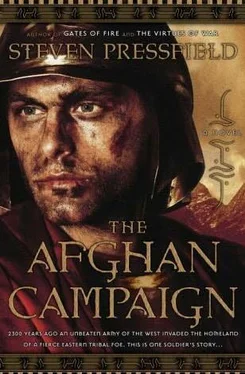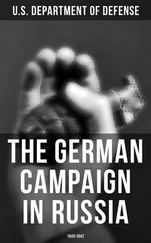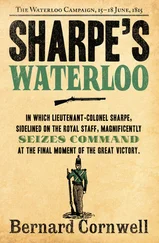Steven Pressfield - The Afgan Campaign
Здесь есть возможность читать онлайн «Steven Pressfield - The Afgan Campaign» весь текст электронной книги совершенно бесплатно (целиком полную версию без сокращений). В некоторых случаях можно слушать аудио, скачать через торрент в формате fb2 и присутствует краткое содержание. Жанр: Исторические приключения, на английском языке. Описание произведения, (предисловие) а так же отзывы посетителей доступны на портале библиотеки ЛибКат.
- Название:The Afgan Campaign
- Автор:
- Жанр:
- Год:неизвестен
- ISBN:нет данных
- Рейтинг книги:4 / 5. Голосов: 1
-
Избранное:Добавить в избранное
- Отзывы:
-
Ваша оценка:
- 80
- 1
- 2
- 3
- 4
- 5
The Afgan Campaign: краткое содержание, описание и аннотация
Предлагаем к чтению аннотацию, описание, краткое содержание или предисловие (зависит от того, что написал сам автор книги «The Afgan Campaign»). Если вы не нашли необходимую информацию о книге — напишите в комментариях, мы постараемся отыскать её.
The Afgan Campaign — читать онлайн бесплатно полную книгу (весь текст) целиком
Ниже представлен текст книги, разбитый по страницам. Система сохранения места последней прочитанной страницы, позволяет с удобством читать онлайн бесплатно книгу «The Afgan Campaign», без необходимости каждый раз заново искать на чём Вы остановились. Поставьте закладку, и сможете в любой момент перейти на страницу, на которой закончили чтение.
Интервал:
Закладка:
My father fought at the Granicus River, at Tyre, Gaza, and at Issus. He was an authentic hero. My brothers are too. Once, when I was sixteen, my father sent home an army warrant worth a quarter talent of gold. We bought a second farm with it, with two barns and a year-round creek, and had enough left over to fence the place in stone.
It was my father’s keenest wish that I, the youngest brother, not come out to war. My mother, further, was violently opposed to any step that would take me away from the land. “You may call it your misfortune, Matthias,” she declared, “to have been whelped last of the litter. But, like it or not, you are my bulwark and the bulwark of this farm. Your father is gone. We shall never see your brothers again. Lust for glory will be their finish; they will leave great names and nothing more.”
My mother feared that I, gone overseas, would tread into the snare of some foreign wench and, taking her to wife, never return to Macedon.
I was eighteen, however, and as mad for glory as every other overheated young blood in a kingdom whose twenty-five-year-old sovereign, Alexander son of Philip, had in only four years sacked earth’s mightiest empire and turned our homeland delirious with conquest, fame, and treasure.
In the Macedonian army, enlistments are measured not by years but by cycles, or “bumps.” A bump is eighteen months. Minimum enlistment is two bumps, one to be trained and one to serve, but a man must commit for a third cycle, a total of four and a half years, if and when he is called overseas. It worked this way: A recruit entered service with a regiment of the Occupation Army. This was the force left behind by Alexander to hold down Greece and the tribal north. All these contingents were territorial; you had to come from the district or you couldn’t get in. As Alexander’s needs in Asia necessitated, he sent home for replacements. Sometimes entire regiments were called up; other times individuals, either those in specific military specialties such as intelligence or siege engineering, or simply infantrymen with seniority whose lucky number came up.
All this was moot for a youth of my district, Apollonia. Apollonia has no infantry regiment. The region is cavalry country. The most famous squadron of Alexander’s Companions, the ile of Socrates Sathon, comes from Apollonia. This squadron, in which both my brothers served, led the charge at the battle of the Granicus River; it fought at Alexander’s right hand in the great victories of Issus and Gaugamela. It has more hero statues at Dium than any other squadron, including the Royal. My best friend Lucas and I, and every other war-crazed youth in the territory, had trained year-round since before we could walk, on fire for the day we would enter the trials and with heaven’s aid become, like Apollonia’s heroes before us, King’s Companions.
We were too late, Lucas and I. By the time our hour came, Alexander’s army had pushed so deep into Asia and had assimilated troops from so many vanquished nations that our king no longer sent home for Companion cavalry, except to replace men killed, wounded, or retired. The horse troops he employed now were all hired squadrons-Persians mostly, with Syrians, Lydians, Cappadocians, and riders of other kingdoms of the conquered East. No Mack could join these, even if he could get overseas, which he couldn’t, or could speak the barbarian tongue, which he wouldn’t.
There was only one way for Lucas and me to get out to Asia. As hired infantry. As mercenaries.
At that time, scores of private contractors-called pilophoroi for the felt caps they wore-traveled the cities of Greece and Asia Minor, signing up troops. It was a business. Candidates paid a fee, called a “pony” because it was so steep a man could buy a fine colt with it. The felt-caps got them in.
Turning eighteen, Lucas and I trekked three days to the port of Methone, the hiring depot for mercenary infantry. The taverns were crawling with grizzled professionals-Arcadians and Syracusans, Cretans and Rhodians, even officers of the Achaeans and Spartans. They all knew each other from prior hitches; they had mates and commanders who could get them aboard. Lucas and I were the youngest by years. We knew nobody. No pilophoros would touch us, no matter how convincingly we lied about our age or our service histories (of which we had none).
We stayed ten days, with our payoff cash dwindling rapidly, trying to talk or buy our way in anywhere. At the last hour we went seeking the recruiting general himself. Of course we couldn’t get near him. A Line Sergeant from Pella kicked us out. “Wait a minute,” he said, hearing our accents. “Are you boys from Apollonia?”
He wanted to know if we could ride.
We were centaurs!
The sergeant drew up our papers on the spot and wouldn’t take any money either. He put us down as Mounted Infantry. That was what Alexander needed most. Lucas and I could not believe our luck. We asked what outfit we’d be with and when we’d get our horses.
“No outfits,” the sergeant said. “And no horses neither.” He had put us on the rolls because we were Macedonians, amid all these foreigners. “No overseas captain ever turned down a lad from home.”
We thanked him with all our hearts. He brushed it off. “Don’t worry about what outfit you ship out with, or if you never see an hour of drill. Out east,” he said, “the king’ll draft you wherever he needs you.”
2
Our force of replacements landed at Tripolis in Syria on the sixteenth of Daesius, early summer, in the sixth year of Alexander’s reign, the fourth since the expeditionary force had crossed out of Europe into Asia. The king and his army were then a thousand miles east, on their way from Persepolis, Persia’s capital, to Ecbatana in Media, the summer palace of her kings. The Persian Empire had fallen; Alexander now pursued its fugitive king. Our lord’s pack train, reports said, was seven thousand camels and ten thousand pairs of asses, all laden with gold.
Our detachment of replacements was sixty-one hundred in forty-seven ships. The harbor at Tripolis couldn’t hold that many, and, as the vessels had neither berths nor provisions to lie-to overnight in the roads, a conference was held of the captains, who were just merchant skippers hired for pay, at which it was decided that our ferry (which is what it was) and about ten others would be rowed to shallow water, where we scuffs were told to grab our kit, hop over the side, and swim for it. Which we did. It was a grand lark, except that I ruined a fine pair of boots in the saltwater, growing too weary to hold them over my head. This is how I landed in Asia, soaked as a drowned cat, and barefoot.
Replacements are not an army. Our mob had been formed not into regiments but into “S.C.’s,” shipboard contingents, and did not, when we landed, even have our arms. The cavalry didn’t have its horses. The animals were following in other transports. There was a tent city waiting, and an escort of six hundred Syrian mercenaries, and fourteen hundred hired infantry of Lycia, with Macedonian officers, who were to take us up to Marathus and from there by way of Larissa to Thapsacus, where we would cross the Euphrates into Mesopotamian Syria and Kurdistan. The march to catch up with Alexander would take between three and four months.
As always in a new camp, the troops plunged at once into their favored pastimes-touring the site looking up friends, and poaching every item of kit they could lay hands on. You couldn’t set down a heel of bread without somebody snatching it, and a decent hat or a pair of road-slappers were sure goners. A man hung his purse next to his testicles and, after shaking hands with a stranger, checked to make sure both sacks were still where he had left them.
Читать дальшеИнтервал:
Закладка:
Похожие книги на «The Afgan Campaign»
Представляем Вашему вниманию похожие книги на «The Afgan Campaign» списком для выбора. Мы отобрали схожую по названию и смыслу литературу в надежде предоставить читателям больше вариантов отыскать новые, интересные, ещё непрочитанные произведения.
Обсуждение, отзывы о книге «The Afgan Campaign» и просто собственные мнения читателей. Оставьте ваши комментарии, напишите, что Вы думаете о произведении, его смысле или главных героях. Укажите что конкретно понравилось, а что нет, и почему Вы так считаете.












